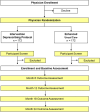Deprescribing anticholinergics to preserve brain health: reducing the risk of dementia through deprescribing (R2D2): study protocol for a randomized clinical trial
- PMID: 39578926
- PMCID: PMC11583418
- DOI: 10.1186/s13063-024-08618-4
Deprescribing anticholinergics to preserve brain health: reducing the risk of dementia through deprescribing (R2D2): study protocol for a randomized clinical trial
Abstract
Background: Older adults commonly experience chronic medical conditions and are at risk of cognitive impairment as a result of age, chronic comorbidity, and medications prescribed to manage multiple chronic conditions. Anticholinergic medications are common treatments for chronic conditions and have been repeatedly associated with poor cognitive outcomes, including delirium and dementia, in epidemiologic studies. However, no study has definitively evaluated the causal relationship between anticholinergics and cognition in a randomized controlled trial design. Utilizing our prior experience in deprescribing anticholinergic medications in various clinical environments, we designed an outpatient deprescribing intervention to prospectively test the potential causal relationship between anticholinergics and cognition in primary care older adults.
Methods: This cluster randomized clinical trial will be conducted to evaluate the impact of an anticholinergic deprescribing intervention compared to usual care on outcomes of cognition and safety in primary care older adults. Participants will include those aged 65 years and over, receiving primary care in the greater Indianapolis area, using a strong anticholinergic within the last 2 weeks or with evidence of high-risk exposure in the past year. Those excluded will have a diagnosis of Alzheimer's disease or related dementia, or serious mental illness. The trial plans to enroll 344 participants who will be cluster-randomized at the level of primary care physician to avoid contamination. Participants will complete outcome assessments every 6 months up to 2 years by blinded outcome assessors. The primary outcome of the study is a composite measure of cognition that includes domains assessing executive cognitive function, language, and memory. Secondary outcomes include patient-reported measures of pain intensity, depression, anxiety, sleep disturbance, and health-related quality of life.
Discussion: The R2D2 trial will be the largest and longest prospective randomized trial testing the impact of an anticholinergic-specific deprescribing intervention on cognition in primary care older adults. Results could influence deprescribing methodology and provide new insight on the relationship between anticholinergics and cognition.
Trial registration: ClinicalTrials.gov NCT04270474. Registered on February 17, 2020.
Keywords: Anticholinergics; Cognition; Dementia; Deprescribing.
© 2024. The Author(s).
Conflict of interest statement
Declarations. Ethics approval and consent to participate: All procedures have received and maintained ethical approval from the Institutional Review Board of the Indiana University (IRB# 1811254189; Federal-Wide Assurance Number, FWA00003544). The trial has also been registered at ClinicalTrials.gov (Identifier: NCT04270474). Consent for publication: Not applicable—no identifying images or other personal or clinical details of individual participants are presented here or will be presented in reports of the trial results. The participant information materials and informed consent form are available from the corresponding author on request. Competing interests: Dr. Boustani serves as a Chief Scientific Officer and co-Founder of Blue Agilis; the Chief Health Officer of DigiCare Realized, Inc; and the Chief Health Officer of Mozyne Health, Inc. He has equity interest in Blue Agilis, Inc; DigiCare Realized, Inc; and Mozyne Health, Inc. He sold his equity in Preferred Population Health Management LLC and MyShift, Inc (previously known as RestUp, LLC). He serves as an advisory board member or consultant for Eli Lilly and Co; Eisai, Inc; Merck & Co Inc; Biogen Inc; and Genentech Inc. These conflicts have been reviewed by Indiana University and has been appropriately managed to maintain objectivity. All other authors report no conflicts of interest.
Figures
Update of
-
Deprescribing Anticholinergics to Preserve Brain Health: Reducing the Risk of Dementia through Deprescribing (R2D2): Study Protocol for a Randomized Clinical Trial.Res Sq [Preprint]. 2024 Oct 28:rs.3.rs-4682599. doi: 10.21203/rs.3.rs-4682599/v1. Res Sq. 2024. Update in: Trials. 2024 Nov 22;25(1):788. doi: 10.1186/s13063-024-08618-4. PMID: 39574889 Free PMC article. Updated. Preprint.
References
-
- Boudreau RM, Hanlon JT, Roumani YF, et al. Central nervous system medication use and incident mobility limitation in community elders: the health, aging, and body composition study. Pharmacoepidemiol Drug Saf. 2009;18(10):916–22. 10.1002/pds.1797. [publishedonlinefirst:2009/07/09]. - DOI - PMC - PubMed
Publication types
MeSH terms
Substances
Associated data
Grants and funding
LinkOut - more resources
Full Text Sources
Medical
Miscellaneous





